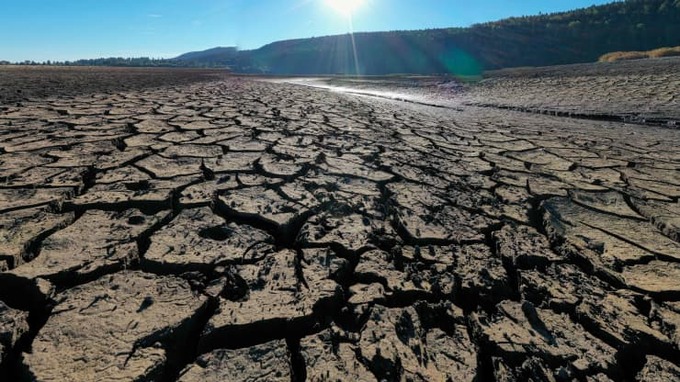May 21, 2025 | 09:01 GMT +7
May 21, 2025 | 09:01 GMT +7
Hotline: 0913.378.918
May 21, 2025 | 09:01 GMT +7
Hotline: 0913.378.918

This photo taken on August 3, 2022, shows the dried “Lac de l’Entonnoir” known as “Lac du Bouverans” in Bouverans, eastern France.
The August report of the European Drought Observatory (EDO), overseen by the European Commission, said 47 per cent of Europe is under warning conditions, with clear deficit of soil moisture, and 17 per cent in a state of alert, in which vegetation is affected.
"The severe drought affecting many regions of Europe since the beginning of the year has been further expanding and worsening as of early August," the report said, adding that the western Europe-Mediterranean region was likely to experience warmer and drier than normal conditions until November.
Much of Europe has faced weeks of baking temperatures this summer, which worsened the drought, caused wildfires, set off health warnings, and prompted calls for more action to tackle climate change.
The current drought appeared to be the worst in at least 500 years, assuming final data at the end of the season confirmed the preliminary assessment, the Commission said in a statement.
Summer crops have suffered, with 2022 yields for grain maize set to be 16 per cent below the average of the previous five years and soybean and sunflowers yields set to fall by 15 per cent and 12 per cent respectively.
Hydropower generation has been hit, with further impact on other power producers due to a shortage of water to feed cooling systems.
Low water levels have hampered inland shipping, such as along the Rhine, with reduced shipping loads affecting coal and oil transport.
The EDO said mid-August rainfall may have alleviated conditions, but in some cases it had come with thunderstorms that caused further damage.
The observatory's drought indicator is derived from measurements of precipitation, soil moisture and the fraction of solar radiation absorbed by plants for photosynthesis.
Record-breaking temperatures in Europe this summer have disrupted transportation, displaced thousands of people, and resulted in hundreds of heat-related deaths. The heat has also exacerbated wildfires, which have grown more destructive in recent years.
“The combination of a severe drought and heatwaves has created an unprecedented stress on water levels in the entire EU,” European Innovation Commissioner Mariya Gabriel said in a statement. “We are currently noticing a wildfires season sensibly above the average and an important impact on crops production.”
The Western Europe-Mediterranean region will likely see warmer and drier than usual conditions until November, the report said.
Climate change has made high temperatures and droughts more intense and widespread. And lower nighttime temperatures that typically provide critical relief from the hot days are disappearing as the planet warms.
Water and heat stress have slashed Europe’s 2022 crop yields, with forecasts for grain maize, soybean and sunflowers expected to be 16%, 15% and 12% below the average of the previous five years, respectively.
A lack of rainfall has also affected river discharges widely across Europe. Reduced water volume has hit the energy sector for hydropower generation and cooling systems of other power plants.
Drought hazard has been rising most notably in Belgium, France, Germany, Hungary, Italy, Luxembourg, Moldova, the Netherlands, northern Serbia, Portugal, Romania, Spain, Ukraine and the U.K, the report said.
(RT; CNBC)

(VAN) Attempts to bring down the price of the Japanese staple have had little effect amid a cost-of-living crisis.

(VAN) Fourth most important food crop in peril as Latin America and Caribbean suffer from slow-onset climate disaster.

(VAN) Shifting market dynamics and the noise around new legislation has propelled Trouw Nutrition’s research around early life nutrition in poultry. Today, it continues to be a key area of research.

(VAN) India is concerned about its food security and the livelihoods of its farmers if more US food imports are allowed.

(VAN) FAO's Director-General emphasises the need to work together to transform agrifood systems.

(VAN) Europe is facing its worst outbreak of foot-and-mouth since the start of the century.

(VAN) The central authorities, in early April, released a 10-year plan for rural vitalization.